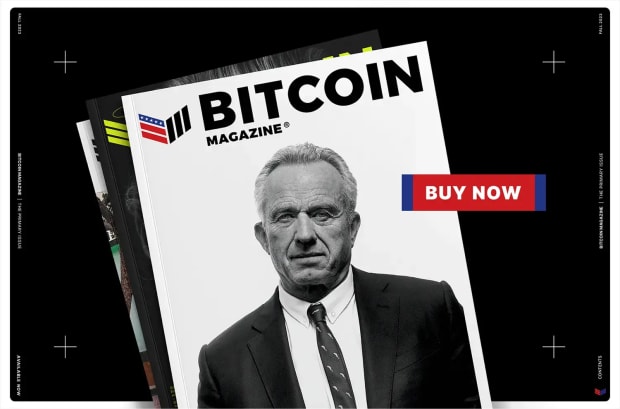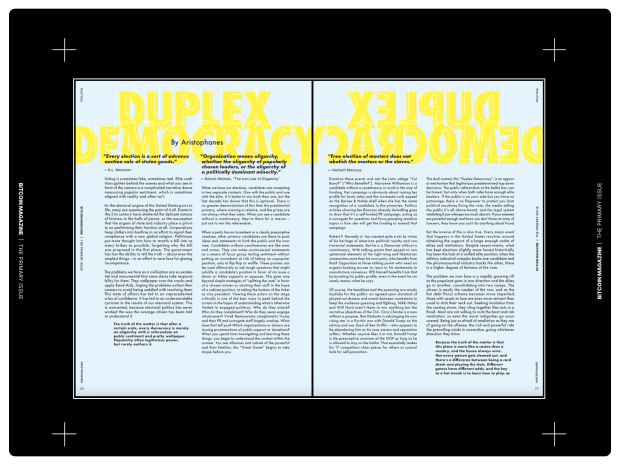[ad_1]
This article is featured in Bitcoin Magazine’s “The Primary Issue”. Click here to get your Annual Bitcoin Magazine Subscription.
“Every election is a sort of advance auction sale of stolen goods.”
― H.L. Mencken
Voting is sometimes fake, sometimes real. Elite coalitions gather behind the scenes and what you see in front of the camera is a complicated narrative dance measuring popular sentiment, which is sometimes aligned with reality and often isn’t.
As the electoral engine of the United States purrs to life, many are questioning the point of it all. Events in the 21st century have shattered the delicate notions of fairness in the halls of power, or the assumption that the organs of state and industry place a priority on performing their function at all. Corporations heap dollars into bonfires in an effort to signal their compliance with a new global religion. Politicians put more thought into how to stretch a bill into as many bribes as possible, forgetting why the bill was proposed in the first place. The government has lost the ability to tell the truth — about even the simplest things — in an effort to save face for glaring incompetence.
The problems we face as a civilization are so existential and monumental that none dares take responsibility for them. They wallpaper over the cracks and apply Band-Aids, hoping the problems outlast their careers to avoid being saddled with resolving them. This state of affairs has led to an unprecedented crisis of confidence. It has led to an understandable cynicism in the results of our electoral system. This is warranted, because electoral politics has never worked the way the average citizen has been told to understand it.
The truth of the matter is that after a certain scale, every democracy is merely an oligarchy with a referendum on public sentiment and pretty wallpaper. Popularity often legitimizes power, but rarely authors it.

“Organization means oligarchy, whether the oligarchy of popularly chosen leaders, or the oligarchy of a politically dominant minority.”
― Robert Michels, “The Iron Law of Oligarchy”.
When we have our elections, candidates are competing in two separate contests. One with the public and one with the elite. It is better to win both than one, but the last decade has shown that this is optional. There is no greater demonstration of this than the presidential primary, where winning is relative, and the prizes are not always what they seem. When you see a candidate without a constituency, they’re there for a reason — just not to win the referendum.
When a party has an incumbent or a clearly presumptive nominee, other primary candidates are there to push ideas and statements to both the public and the nominee. Candidates without constituencies are like arms and armor. They can make controversial statements as a means of focus groups — testing sentiment without putting an incumbent at risk of taking an unpopular position only to flip-flop or waffle. These proxies can be used offensively to ask tough questions that might solidify a candidate’s position in favor of an issue a donor or lobby supports or opposes. This goes way beyond simple strategies of “splitting the vote” in favor of a chosen winner, or strutting their stuff in the hope of a cabinet position, or taking the bottom of the ticket as vice president.
Viewing these actors on the stage critically is one of the best ways to peek behind the curtain in the hopes of understanding what is otherwise limited to engaged politicos. Who do they attack? Who do they compliment? Who do they never engage whatsoever? Vivek Ramaswamy compliments Trump and their PR and surrogate staff largely overlap. What does that tell you? Which organizations or donors are issuing proclamations of public support or donations? When you spend time investigating and learning these things, you begin to understand the contest within the contest. You see alliances and cabals of the powerful and their families, the “Great Game” begins to take shape before you.
“Free election of masters does not abolish the masters or the slaves.”
― Herbert Marcuse
Examine these events and ask the Latin adage “Cui Bono?” (“Who Benefits?”). Marianne Williamson is a candidate without a constituency or much in the way of funding. Her campaign is obviously about raising her profile for book sales and the increased curb appeal on the Barnes & Noble shelf when she has the name recognition of a candidate in the primaries. Politico articles showing her finances already dwindling goes to show that it’s a self-funded PR campaign; acting as a surrogate for questions and focus grouping sensitive topics is how she will get the funding to extend that campaign.
Robert F. Kennedy Jr. has created quite a stir by virtue of his heritage of American political royalty and controversial statements. But he is a Democrat without a constituency. With talking points that appeal to conspiratorial elements of the right wing and libertarian communities more than his own party, who benefits from that? Opposition to those talking points who need an organic-looking excuse to react to his statements to manufacture consensus. RFK himself benefits from that by boosting his public profile, even in the event he sincerely means what he says.
Of course, the headlines and the posturing are mostly kayfabe for the public: an agreed-upon standard of played-out dramas and events between contestants to keep the audience guessing and fighting. Nikki Haley and Will Hurd aren’t there to win anything but the narrative objectives of the CIA. Chris Christie is a man without a purpose. Ron DeSantis is sabotaging his own rising star in a Pyrrhic war with Donald Trump on the advice and war chest of Ken Griffin — who appears to be abandoning him as his race wavers and reputation suffers. Whether anyone likes it or not, Donald Trump is the presumptive nominee of the GOP as long as he is allowed to stay on the ballot. That essentially makes his 17 competitors chess pieces for others or cynical bids for self-promotion.

This dual contest, this “Duplex Democracy”, is an approval mechanism that legitimizes predetermined top-down decisions. The public referendum at the ballot box can be honest, but only when both sides have enough elite backers. If the public is on your side but you have no patronage, there is no firepower to protect you from political machines fixing the vote, the media telling the public it’s all above board, and the legal system retaliating if you whimper too much about it. If your enemies are powerful enough and know you don’t have an army of lawyers, they know you can’t do anything about fraud.
But the inverse of this is also true. Every major event that happens in the United States revolves around obtaining the support of a large enough cadre of elites and institutions. Despite recent events, what has kept elections slightly more honest historically has been the lack of a unified elite position: When the military industrial complex backs one candidate and the pharmaceutical industry backs the other, there is a higher degree of fairness of the vote.
The problem we now face is a rapidly growing rift as the populace goes in one direction and the elites go in another, consolidating into two camps. The citizen is easily the weaker of the two, and as the fiat-debt Ponzi scheme becomes more imperiled, those with assets to lose are even more reticent than usual to stick their neck out. Seeking insulation from the coming storm, they cling together like ants in a flood. Most are not willing to rock the boat and risk retaliation, so even the worst indignities go unanswered. Being just as afraid of retaliation as they are of going on the offense, the rich and powerful ride the prevailing winds in cowardice, going whichever direction they blow.
Because the truth of the matter is that this place is more like a casino than a country, and the house always wins. Not every patron gets cleaned out, and there’s a difference between being a card shark and playing the slots. Different games have different odds, and the key to a hot streak is to learn how to play.
This article is featured in Bitcoin Magazine’s “The Primary Issue”. Click here to get your Annual Bitcoin Magazine Subscription.
[ad_2]
Source link

